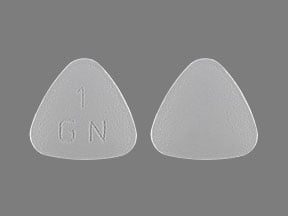
Granisetron Coupons & Savings Card – Discount Prices from $55.00
Granisetron is a medication used to prevent nausea and vomiting caused by cancer treatments like chemotherapy and radiation therapy. It functions by blocking serotonin, a chemical in the body that can induce these symptoms. While it may cause headaches and might be pricier compared to alternatives such as ondansetron (Zofran), Granisetron is effective in managing these side effects of cancer therapy. Always consult with a healthcare professional before starting any new medication to ensure it is appropriate for you.
Our coupons are free to use. Before paying, show the pharmacist your Granisetron savings card to get your free discount. Use our filters below to edit the prescription box to match your needs. The Granisetron prices will update based on your prescription needs. Above our Granisetron coupons, you can change your location to see pharmacy prices and costs in other areas. We're here to help you buy Granisetron at the lowest price with our prescription discount card.
My prescription
Edit
1MG, Granisetron (60 Tablets)
Select pharmacy

CVS
$55.00
COUPON PRICE
Walgreens
$78.60
COUPON PRICE
Albertsons
$644.80
COUPON PRICEGranisetron savings card
Show this card to your pharmacist
CVS
$55.00
BIN
ID
PCN
GRP
019876
LH1180C855
CHIPPO
LHX
Powered by
Granisetron is a medication used to prevent nausea and vomiting caused by cancer treatments like chemotherapy and radiation therapy. It functions by blocking serotonin, a chemical in the body that can induce these symptoms. While it may cause headaches and might be pricier compared to alternatives such as ondansetron (Zofran), Granisetron is effective in managing these side effects of cancer therapy. Always consult with a healthcare professional before starting any new medication to ensure it is appropriate for you.
Our coupons are free to use. Before paying, show the pharmacist your Granisetron savings card to get your free discount. Use our filters below to edit the prescription box to match your needs. The Granisetron prices will update based on your prescription needs. Above our Granisetron coupons, you can change your location to see pharmacy prices and costs in other areas. We're here to help you buy Granisetron at the lowest price with our prescription discount card.
Related serotonin antagonists prescriptions
coupons from$679.41Save 99%
coupons from$298.85Save 91%
coupons from$6.60Save 100%
coupons from$116.20Save 43%
coupons from$1082.18Save 15%
Related serotonin antagonists prescriptions
Sancuso Save 99%coupons from $679.41
Anzemet Save 91%coupons from $298.85
Ondansetron Save 100%coupons from $6.60
Alosetron Save 43%coupons from $116.20
Zuplenz Save 15%coupons from $1082.18
Granisetron dosage forms
Use our Granisetron 1MG coupon with prices from $55.00 for 60 Tablets. You can also use our Granisetron 1MG coupon with prices from $10.16 for 1 Tablet. We have a Granisetron 1MG coupon with prices from $11.32 for 2 Tablets. You can use our Granisetron 1MG coupon with prices from $30.53 for 20 Tablets.
Dosage Quantity Price from Per unit 1MG 60 Tablets $55.00 $0.92 1MG 1 Tablet $10.16 $10.16 1MG 2 Tablets $11.32 $5.66 1MG 20 Tablets $30.53 $1.53
| Dosage | Quantity | Price from | Per unit |
|---|---|---|---|
| 1MG | 60 Tablets | $55.00 | $0.92 |
| 1MG | 1 Tablet | $10.16 | $10.16 |
| 1MG | 2 Tablets | $11.32 | $5.66 |
| 1MG | 20 Tablets | $30.53 | $1.53 |
